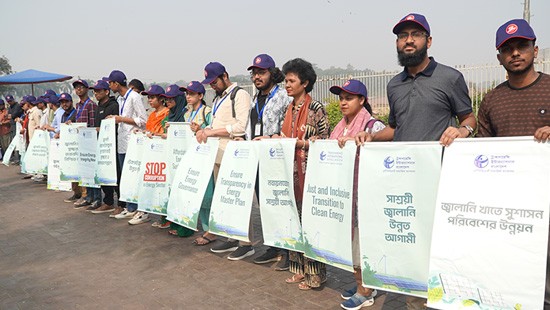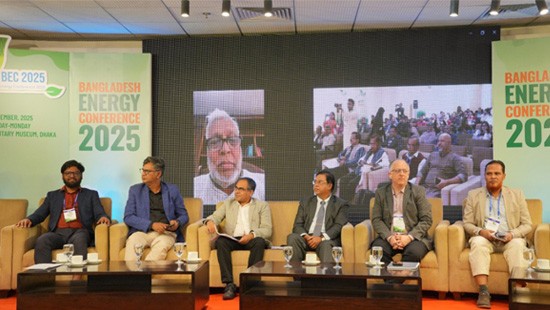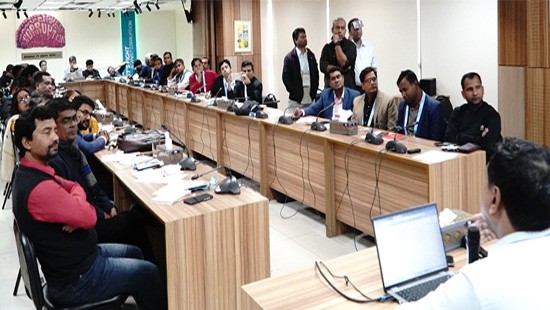Published: 15 June 2020

Lack of planning, coordination, and mismanagement in identifying and controlling the COVID 19 pandemic along with the country’s weak healthcare system due to widespread corruption and long-term neglect towards fundamental human needs put Bangladesh in a catastrophic situation. In tackling the Corona Virus led crisis, also, lack of transparency and chronic governance deficiencies in government adopted initiatives worsen the situation.
The observations came up in a TIB study titled `Governance Challenges in Tackling Corona Virus’ launched through a virtual press conference on 15 June 2020.
 Analysing government adopted initiatives throughout the crisis; the study finds deficiencies in every indicator of good governance in dealing with the epidemic. The report also finds a wide prevalence of alleged corruption in procurement and distribution as well as relief operations for the poor and needy.
Analysing government adopted initiatives throughout the crisis; the study finds deficiencies in every indicator of good governance in dealing with the epidemic. The report also finds a wide prevalence of alleged corruption in procurement and distribution as well as relief operations for the poor and needy.
Using mixed methodological (qualitative and quantitative) research techniques, the study highlights the governance challenges in different government initiatives undertaken to deal with the virus-led crisis before and after its spread. The data analysis of the study was conducted under different indicators of governance, i.e., rule of law, responsiveness, capacity and effectiveness, coordination and participation, accountability, transparency, and control of corruption.
The study observes that the government has failed miserably in taking necessary precautions even after getting three months' time. Failing to ensure the testing facility for the suspected patients, and the spread of the infection due to lack of control in handling the situation has brought the country in an unprecedented condition. Besides, the weak capacity of the health sector as a result of lack of planning and good governance has come to light during the crisis.
Unveiling the study in the virtual webinar, TIB Executive Director Dr Iftekharuzzaman said, “There was a lack of adequate preparation and capacity to deal with the virus everywhere in the world, including the developed world. Even though it is difficult to imagine that Bangladesh would be an exception, we became optimistic of a prospect to effectively fight the crisis when this problem was declared as a national disaster by the top echelons of the government and especially when the Prime Minister declared that no corruption would be tolerated in tackling this crisis. However, the study found deficits in all indicators of good governance regarding different initiatives taken to deal with the virus; besides, corruption has been alarming.”
 The study also identifies the tendency to cover up irregularities, corruption, and mismanagement through restrictions on disclosure of information and bringing the whistle-blowers under accountability in a way that encourages corruption. At a point, restrictions under the Digital Security Act 2018 were imposed on all health workers, including all physicians under the Ministry of Health for the disclosure of any statement or opinion in public, in the newspaper, or in any other media without the permission of the higher authorities. Sixty-seven cases were filed against 37 journalists for disseminating news of theft and embezzlement in relief distribution in different parts of the country.
The study also identifies the tendency to cover up irregularities, corruption, and mismanagement through restrictions on disclosure of information and bringing the whistle-blowers under accountability in a way that encourages corruption. At a point, restrictions under the Digital Security Act 2018 were imposed on all health workers, including all physicians under the Ministry of Health for the disclosure of any statement or opinion in public, in the newspaper, or in any other media without the permission of the higher authorities. Sixty-seven cases were filed against 37 journalists for disseminating news of theft and embezzlement in relief distribution in different parts of the country.
According to the study, the health workers’ health risks and crisis in medical management increased due to irresponsibility and corruption in the supply of protection materials. Moreover, the concerned authorities failed to respond effectively to the developing situations in the wake of the epidemic, observes the study.
There has been a tendency to make bureaucratic decisions by ignoring specific opinions in all cases, including `lockdown`, the study also finds. “Despite the repetitive emphasis on social isolation and distancing by the relevant experts in countering the virus spread, a situation has been created_at under the pressure of businessmen and influential quarters in which the government decision has been rendered nearly ineffective. Misleading messages were disseminated undermining social isolation ultimately resulted in the virus entering into the community transmission phase,” said Dr Zaman.
According to the study, the actual target beneficiaries of the government initiatives were deprived due to a lack of coordination. Stating that by capitalizing on the initiatives taken to tackle the crisis, many have seen it as an opportunity to make an undue profit through corruption in collusion, Dr Zaman said, "regardless of the Prime Minister's stern warning against corruption at various stages of tackling the crisis, since those involved in irregularities and corruption are not brought to justice. It is only possible to implement the top-level declaration of the government by controlling corruption by identifying them and ensuring effective accountability.”
Highlighting the importance of freedom of information and expression during such a crisis, the study observes that "If the government wants to tackle this crisis, the right to get and publish accurate information must not be diminished.”
In the press conference, among others, TIB Adviser-Executive Management Professor Dr. Sumaiya Khair and Director-Research & Policy (R&P) Mohammad Rafiqul Hassan were present. TIB Director-Outreach and Communication (O&C) Sheikh Manjur-E-Alam conducted the virtual event. Researchers of the study TIB Programme Manager (PM)-R&P Manzoor-E-Khoda and Deputy Programme Manager (DPM)-R&P Md. Julkarnayeen presented the study findings at the event, accompanied by research supervisor Senior Programme Manager-R&P Shahzada M Akram. Other members of the study team PM-R&P Taslima Akter and DPM-R&P Morsheda Akter were also present.
The study also made 15 points recommendations to tackle the unearthed challenges, including expanding the facility of sample testing through proper use of existing equipment and manpower at government and private levels to district level through the maximum use of existing capacity. Among the other notable recommendations, it also included ensuring proper management of medical equipment, financial assistance for the ultra-poor, informal sector workers and day laborers, and waiving the current agricultural loans.
For more, please click here.
************************************






